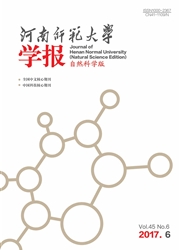

 中文摘要:
中文摘要:
以豫豆‘19’为材料,研究了大豆幼苗在适温(25℃)和高温(35℃,40℃)下叶片某些生理生化指标的变化,高温胁迫在人工气候箱中进行.结果表明:在高温下,以25℃为对照,随着胁迫时间的延长,RWC含量和总叶绿素(Chl)含量明显下降;MDA含量明显增加,膜脂过氧化作用加强;Pro含量也逐渐增加;SOD活性在胁迫初期明显增加,说明大豆幼苗可通过增加脯氨酸含量以及SOD活性来提高其耐热性.随着胁迫时间延长,SOD活性出现下降的趋势,大豆幼苗受害明显加重.相关分析表明,相对含水量(RWC)、丙二醛(MDA)和脯氨酸(Pro)含量呈显著负相关(r〉-0.91),丙二醛(MDA)含量与脯氨酸(Pro)含量呈极显著相关(r〉0.93),可以作为耐热性鉴定指标.
 英文摘要:
英文摘要:
Taking yu dou '19 'as test material,this paper has studied several related physiological indexes in Soybean seedlings under the optimum temperature(25 ℃) and high temperature(35 ℃,40 ℃).Heat processing has been carried on in the artificial climate box.Compared with the temperature of 25 ℃,the results show that the RWC and the chlorophyll content decreased significantly,contents of malondialdehyde(MDA) and free proline(Pro) have gradually increased with the time of high temperature continuing;superoxide dismutase(SOD) activities in flag leaf of soybean have increased obviously at early stage of high temperature stress.The results indicate that the heat tolerance of Soybean seedlings is improved by enhancing the contents of free proline and activities of SOD.And with stress time lasting,the activities of SOD decrease remarkably.Soybean seedlings suffer injury significantly.The correlation analysis show that RWC,MDA and Pro have significant impositively correlation(r-0.91),MDA and Pro have significant positively correlation(r0.93).Therefore,they could be used as heat tolerance indices of soybean.
 同期刊论文项目
同期刊论文项目
 同项目期刊论文
同项目期刊论文
 Effects of dissolved oxygen and influent COD/N ratios on nitrogen removal in horizontal subsurface f
Effects of dissolved oxygen and influent COD/N ratios on nitrogen removal in horizontal subsurface f Depth filtration using novel fiber-ball filter media for the treatment of high-turbidity surface wat
Depth filtration using novel fiber-ball filter media for the treatment of high-turbidity surface wat Performance of laboratory-scale constructed wetlands coupled with micro-electric field for heavy met
Performance of laboratory-scale constructed wetlands coupled with micro-electric field for heavy met Effect of supplying a carbon extracting solution on denitrification in horizontal subsurface flow co
Effect of supplying a carbon extracting solution on denitrification in horizontal subsurface flow co 期刊信息
期刊信息
